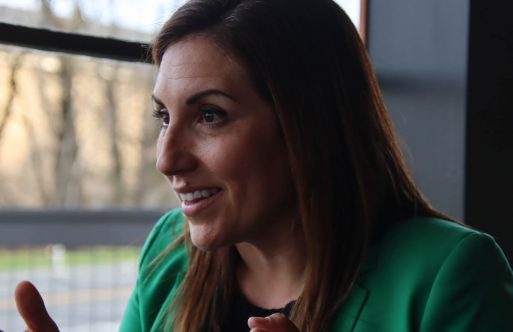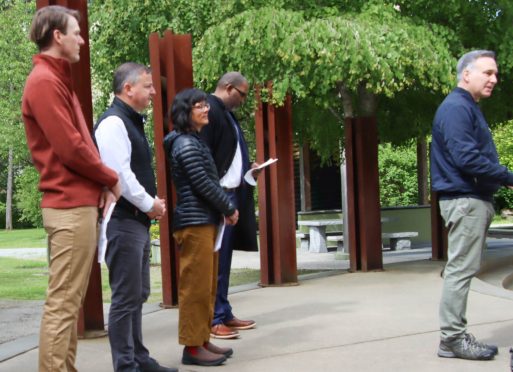By Tracy Record
White Center Now editor
Unlike county-convened Town Halls of the past, the one held this year focused more on planning initiatives than specific county services
The town hall was held online this past Tuesday night. Department of Local Services director John Taylor facilitated. He recommended checking out the Community Work Plans:
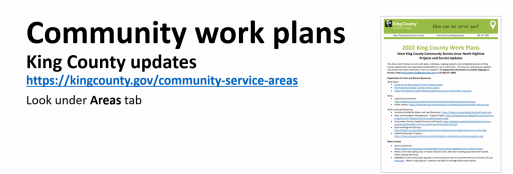
COUNTY COUNCILMEMBER: This area’s King County Councilmember Joe McDermott said he’s recovering from COVID. He noted that his district stretches from Capitol Hill to Burien to Vashon/Maury Islands. He acknowledged the fires that have ravaged White Center’s business district in the past year and recapped King County attempts to help with recovery and security. He also noted the NH Subarea Plan, participatory budgeting, and the new fireworks ban, taking effect this year. He also said the county’s worked hard to distribute state and federal funding that’s come in for pandemic relief – requiring eight “supplemental budgets” to work it all out. This money’s gone to everything from vaccines to rent relief to increasing shelter capacity to addressing food insecurity by supporting food banks.
PARTICIPATORY BUDGETING: Next guest was a member of the Community Investment Budget Committee working on this, Kimnang Seng. He explained the committee includes members from the county’s five “local service areas,” including North Highline. Since June, the committee has met once or twice a week. “It’s been a challenging experience, but it’s been a great one,” Seng said, adding that the CIBC has kept equity in the forefront. White Center submitted the most ideas for spending a share of the county-allotted money, more than 300; in May, he said, the community will get a ballot to vote on some of them. “Now we are in the proposal-development phase.” Here are the sort of things they’re looking at:
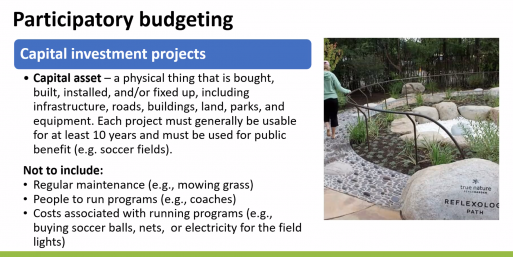
Skyway and White Center have some extra money to spend in this process, from the marijuana tax, because the areas have borne the majority of cannabis businesses:
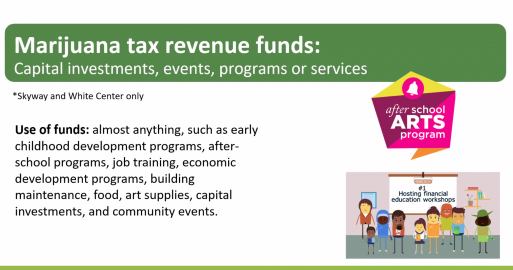
For more information on Participatory Budgeting, go here.
COMMUNITY NEEDS LIST: We’ve reported on this before. The needs can be “anything that’s within the power of the county to deliver,” said Taylor. They’ve been working on it with the White Center Community Development Association, whose executive director Sili Savusa spoke. Here’s the overview of the process:
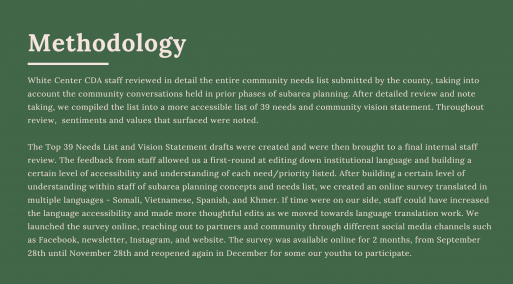
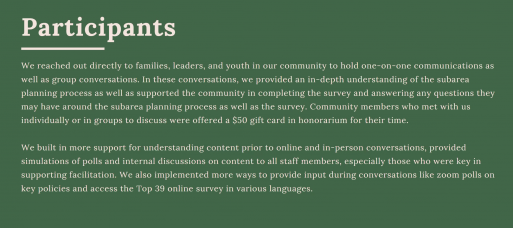
She also broke out the characteristics and demographics of participants. (Also, 40 percent were homeowners, 44 percent renters.)
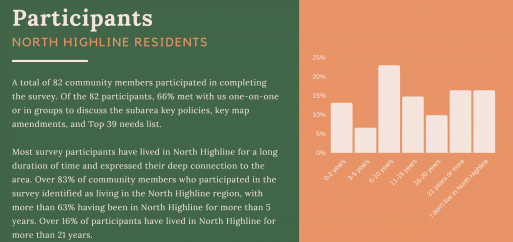
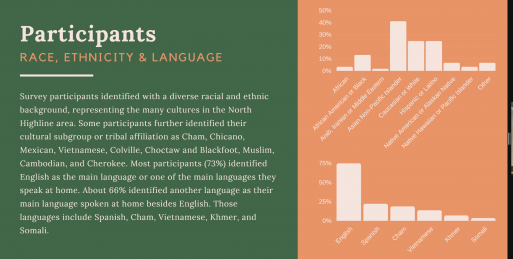
It’s a 39-point list, Savusa said. They organized it into seven areas, ranked on a 1-5 scale of least to most important. Here are the highest-ranked points in housing:
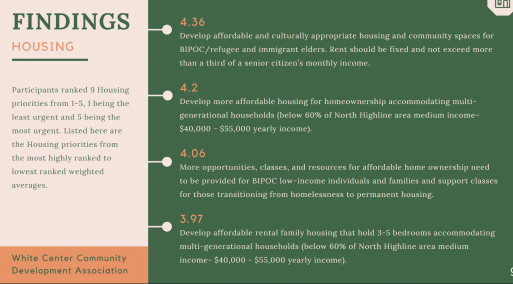
Highest-ranked points in community:
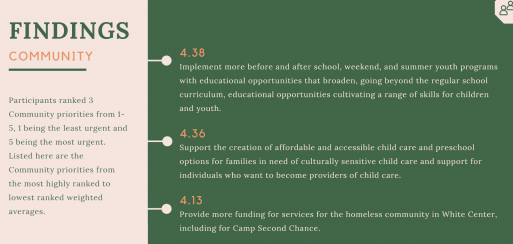
In employment:
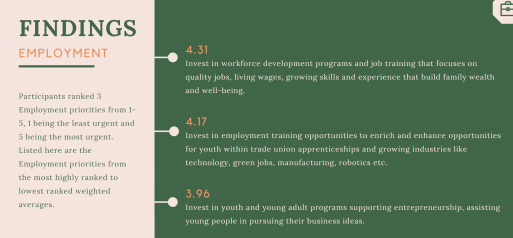
For businesses:
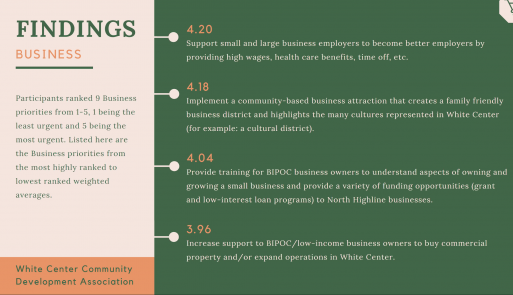
In safety:
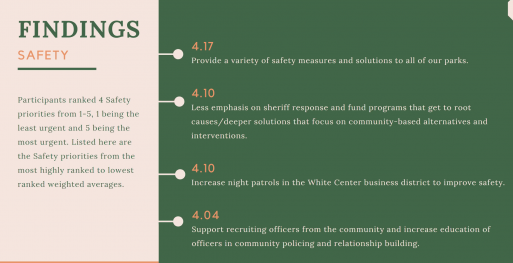
For parks:
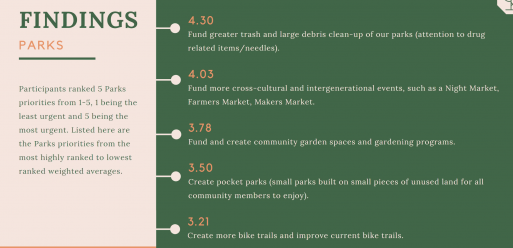
And for transit/streets:
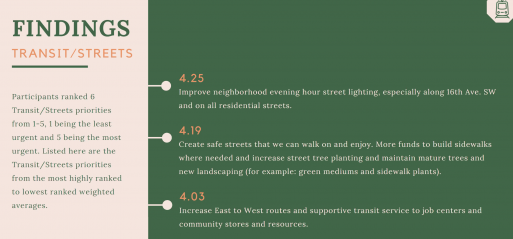
Savusa pointed out that the top 20 priorities had a lot of overlap. They’ve also drafted a “vision statement’ for North Highline:
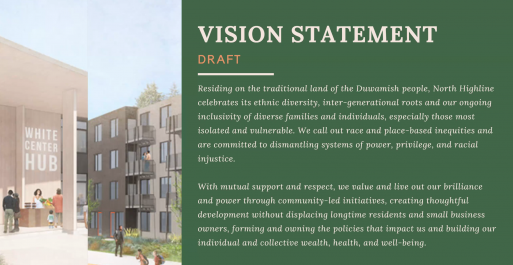
POLLING: The meeting then moved into some informal online polling regarding some of the same emphasis areas. It was a rather small sample, and they had some technical difficulties along the way, so we’re not chronicling. Overall, the answers from the meeting attendees seemed to run along similar lines to previously conducted survey results the county presented along the way. Topics of note along the way included “building more sidewalks.”
Q&A: Liz Giba was first to ask one. She explained that she had asked the county with help in protesting a recent application for another marijuana-growing/processing business on 16th SW and was rejected. She went ahead and found a way to protest the application, which she says has since been denied, but wondered why the county couldn’t help. McDermott thought that type of business wouldn’t necessarily require the type of buffer that another type of cannabis business might have. King County’s Jacqueline Lewis, who’s working on the Subarea Plan, noted that the plan that’ll be presented to the County Council later this month would specifically disallow that type of business “in a large part of White Center.” Another attendee asked about a “disconnect” in the Subarea Plan and zoning maps. Taylor said the Subarea Plan reflects what was heard from community members, not something the county is trying to push. He said the proposed plan is the result of two years of work with the community. McDermott said zoning maps are not an obligation to build. No, but it means that level of building could be done, the attendee reiterated. The next attendee to comment observed that the zoning maps were difficult to read. She also said none of her neighbors were aware about the changes in the works. McDermott promised “a lot more conversation” as the proposed plans and changes worked their way through the official public-hearing process.
The next participant to comment said he felt many of the questions were “out of touch” with community concerns, such as needs at schools, and a growing “class divide.” He proposed questions such as ‘how can we reprioritize our spending?’ for addressing needs such as mental health. McDermott talked about the Regional Homelessness Authority and its work.
Giba returned to the zoning maps’ density proposals, reiterating that some drastic changes are possible. The county reps said zoning changes don’t guarantee that redevelopment will occur, but rather open the door for it. But the bottom line is that “this is where growth is supposed to go,” in the urban areas, per state policy, Taylor pointed out. An attendee countered that White Center isn’t necessarily as “urban” as you’d think, and a lack of infrastructure is a challenge – she listed problems such as a lack of adequate street lighting, an absence of sidewalks. She says she’s often heard that concerns “will be addressed in the future” but remains concerned that there isn’t even enough baseline information/awareness about what’s proposed. “Our voices aren’t being heard.” McDermott responded, “I hear your voice,” and stressed again that this isn’t “smokin’ through council,” that a final vote is maybe six months or more away. The attendee said she has an architecture background and has been researching the walkshed in her neighborhood, and in terms of it being characterized as a “transit corridor,” that ‘doesn’t meet the sniff test” – she has to walk a mile for a bus.
Another participant suggested visualizations to help the community understand what’s being proposed. Then Barbara Dobkin chimed in about transportation safety, and dramatic density changes: “What this (could do) is wiping out a community.” She also said that she “do(esn’t) have much faith” in the county after some problems over the years, going back to 2012 when community advocates were told there would be no marijuana stores in North Highline – and suddenly there were half a dozen. Fast forward to current challenges she said the county was addressing – and suddenly they’re going to upzone. She listed a lot of recent building and said, “Trust me, it WILL happen.” She also echoed the previous speaker in saying nobody in her neighborhood is aware of the process. McDermott said he would do his best to be an advocate; Taylor said his department has tried its best to be responsive. He said his department is “agnostic” about what’s in the plan and just wants it to be “the best plan for the community.”
What happens next with the Community Needs List? It’ll be provided to county departments for them to consider and consult in the budgeting process, Taylor said.
Thyda Ros of the Khmer Community said she wants to be sure they’re included in discussions and consideration for budgeting; they are still without a commuunity center, for example, and are dealing with displacement.
HOW TO CONNECT WITH KC LOCAL SERVICES: Town Halls may be only once a year, but they offer online Local Lunch Q&A opportunities at noon Fridays – find out more here.

 The
The 